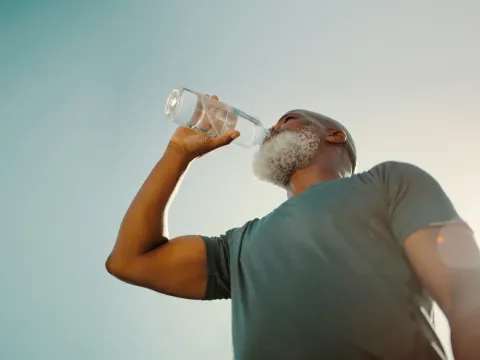- AdventHealth

Choose the health content that’s right for you, and get it delivered right in your inbox.
Extreme heat is more than just uncomfortable; it can be deadly. Learn how heat affects your heart and how to protect yourself when temperatures rise.
How Rising Temperatures Impact Your Heart Health
Your heart is particularly sensitive to heat. On hot days, it works extra hard to get blood and heat away from the vital organs at your core. Because of this extra burden on the heart, people with pre-existing heart conditions, those with diabetes, older adults and pregnant people may be at higher risk for cardiovascular events from extreme heat. Higher heat may also cause dehydration, which can lead to a greater risk of heart attacks and blood clots.
In addition, while you likely know that air pollution is harmful to your lungs, you may not be aware of its impact on your heart. Air pollution can affect heart health through inflammation and stress that damages your heart and blood vessels. It’s also linked to atherosclerosis, or plaque buildup, in your arteries.
Many factors contribute to poor air quality, including:
- Extreme heat (July 2023 was the hottest month in the United States in nearly two centuries)
- Increased greenhouse gas emissions
- Pollution — from debris, wildfires and more
Even more concerning, a new study from the National Institutes of Health found that, as temperatures rise globally from climate change, cardiovascular deaths from extreme heat in the U.S. are expected to rise to 233% by 2065, with older adults and Black adults disproportionately impacted.
How to Protect Your Heart in the Heat
Staying safe in the heat protects you from dangerous cardiovascular events and conditions like heat exhaustion and heat stroke. Protect your heart from extreme heat by:
- Avoiding strenuous activity — consider cutting outdoor workouts short, moving a little slower or taking your exercise indoors when it’s very hot outside
- Checking the forecast — before heading outside, look to see if there are heat advisories or air quality alerts in your area. You might also consider heading out early in the morning or later in the evening to avoid the hottest parts of the day
- Dressing appropriately — wear light, loose-fitting clothing to improve air circulation around your body
- Seeking shade — on extremely hot days, stay in air-conditioned environments as much as possible. If you’re outside, stay under a shelter or trees that offer cooler shade
- Staying hydrated — drink plenty of water to help your body stay cool. Don’t wait until you’re thirsty to hydrate
- Wearing sunscreen — sunburn can lead to dehydration and make it harder for your body to cool down. Make sure to reapply your sunscreen regularly
Protect Your Heart, Whatever the Weather
Don’t let bad weather throw off your rhythm. In rain and shine, heat and cold, we’re here with leading-edge heart and vascular care. If you have concerns about your heart health, reach out today.


